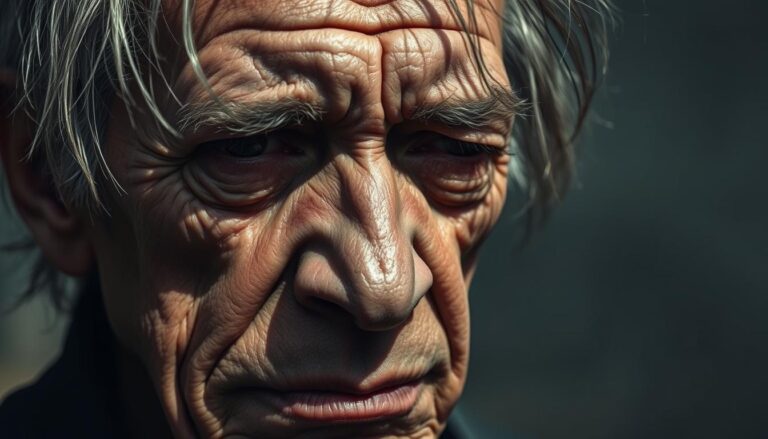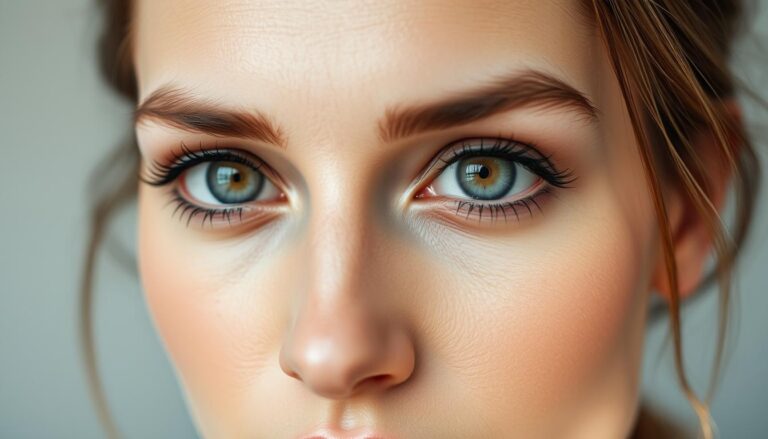From Glow to Glam – We’ve Got You Covered.

What Causes Premature Aging & How to Prevent It
As we age, our skin changes, making it look dull and wrinkled. Premature aging can make us look older than we feel. It affects not just how we look but also our confidence.
Lifestyle choices, environmental stress, and genetics all speed up aging. Knowing these factors is key to fighting anti-aging. It helps us keep our skin looking young and healthy with the right skin care.
Key Takeaways
- Premature aging is caused by lifestyle and environmental factors.
- Knowing the causes helps prevent premature aging.
- Good anti-aging strategies include a detailed skin care routine.
- Genetics also affect how we age.
- Keeping skin young and healthy takes consistent effort.
Understanding Premature Aging: More Than Just Wrinkles
Wrinkles are just the tip of the iceberg when it comes to aging. Premature aging is when our bodies and looks start to break down faster. This can happen because of things we do and our environment.
It’s key to know the difference between chronological and biological aging. Chronological aging is the natural aging we all go through. Biological aging is the real changes happening inside us.
The Difference Between Chronological and Biological Aging
Chronological aging happens to everyone at the same pace. But biological aging can be sped up or slowed down. Knowing this helps us find ways to slow down aging.
| Aspect | Chronological Aging | Biological Aging |
|---|---|---|
| Nature | Ineitable and steady | Influenced by genetics, lifestyle, and environment |
| Progression | Progresses at a fixed rate | Can be accelerated or slowed down |
| Intervention | Limited scope for intervention | Offers opportunities for intervention through lifestyle changes |
Signs You’re Aging Faster Than You Should
Premature aging shows up in many ways, from skin changes to body functions. Spotting these signs early can help us act fast.
Visible Signs on Your Skin
Wrinkles, fine lines, age spots, and less elastic skin are clear signs. These are often the first signs of aging too fast. Using anti-aging natural remedies and a good skincare routine can help.
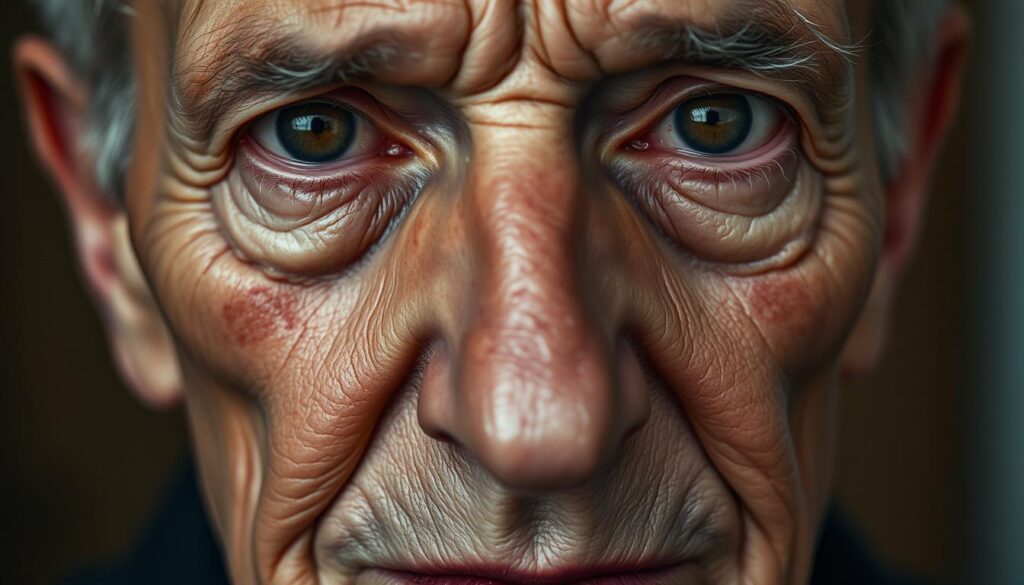
Internally, aging can mean less energy, brain function decline, and getting sick easier. Fixing these needs a whole-body approach. This includes eating right, exercising, and managing stress. Anti-aging natural remedies and healthy habits can reduce wrinkles naturally and boost health.
By recognizing premature aging signs and taking action, we can keep looking and feeling younger.
The Science Behind Skin Aging
Skin aging is a complex process. It involves the breakdown of important skin parts and the buildup of damage over time. This leads to the visible signs of aging we see as we get older.
Collagen and Elastin Breakdown
Collagen and elastin are key proteins for skin health. Collagen gives structure, and elastin lets skin snap back after stretching. As we age, making these proteins slows down, causing wrinkles and sagging.
Free Radical Damage and Oxidative Stress
Free radicals, caused by things like UV rays and pollution, harm skin aging. They lead to oxidative stress, damaging skin cells and speeding up aging.
How Free Radicals Attack Skin Cells
Free radicals steal electrons from skin cells, causing oxidative damage. This can damage DNA, proteins, and cell membranes, leading to cell death or dysfunction.
The Antioxidant Defense System
The body has an antioxidant defense system to fight free radicals. Antioxidants like vitamins C and E protect the skin from oxidative stress. Using antioxidant-rich products can strengthen this defense.
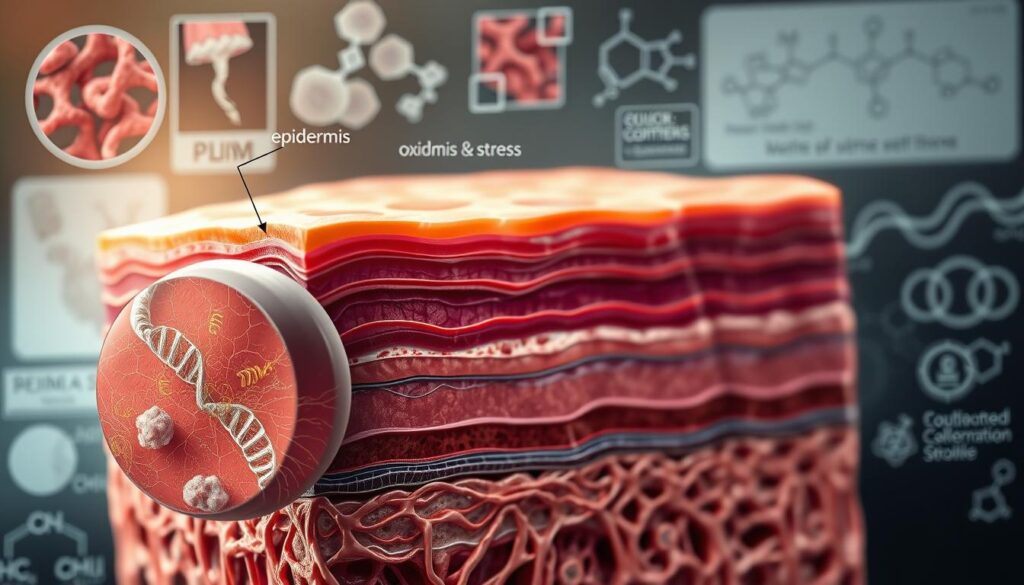
Knowing the science of skin aging helps in creating effective anti-aging plans. The table below shows key aging factors and ways to fight them:
| Factor | Effect on Skin | Anti-Aging Approach |
|---|---|---|
| Collagen Breakdown | Loss of skin firmness and elasticity | Use of retinol and peptides to stimulate collagen production |
| Free Radical Damage | Oxidative stress leading to cell damage | Application of antioxidants like vitamin C and E |
| Elastin Degradation | Skin sagging and loss of elasticity | Use of products containing elastin-boosting ingredients |
What Causes Premature Aging? The Main Culprits
Many factors lead to premature aging, affecting our skin’s health and look. Knowing these causes helps us prevent aging and keep our skin young.
UV Exposure: The #1 External Aging Factor
UV rays are the top cause of premature aging. They harm the skin, causing wrinkles and age spots. Using sunscreen with SPF 30 daily can protect against this damage.
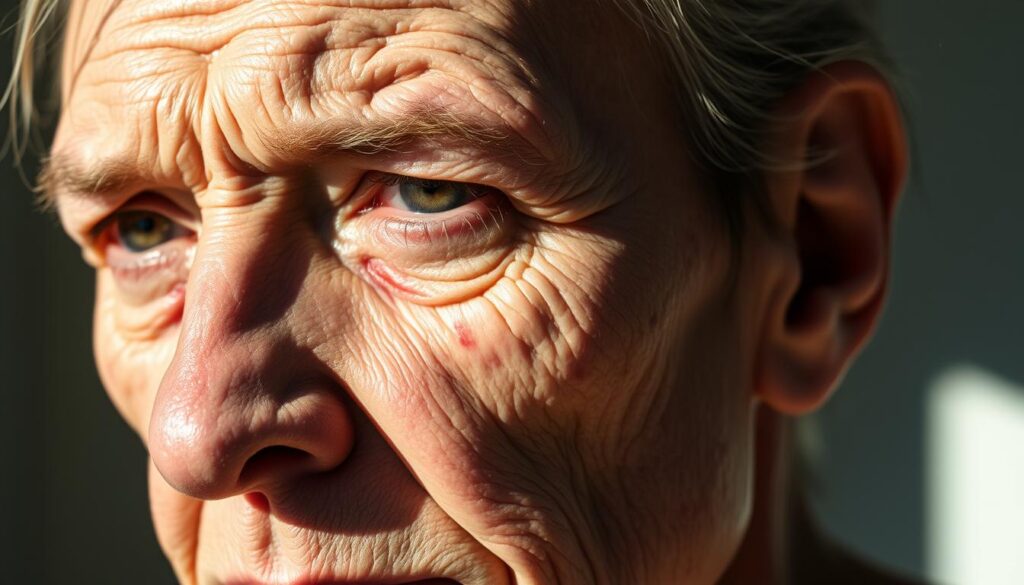
Poor Diet and Nutritional Deficiencies
A bad diet can speed up aging. Eating too much processed food and sugar harms skin cells. Foods like berries and nuts can fight this.
- Eat foods rich in antioxidants
- Include omega-3 fatty acids in your diet
- Stay hydrated by drinking plenty of water
Smoking and Alcohol Consumption
Smoking and drinking too much alcohol also cause early aging. Smoking hurts skin elasticity, and alcohol dries out the skin. Cutting down on these can improve your skin.
Chronic Stress and Sleep Deprivation
Stress and not enough sleep also age us faster. Stress raises cortisol, breaking down collagen, and sleep loss slows skin healing. Meditation and enough sleep can help.
By tackling these main causes, we can prevent premature aging and keep our skin looking young.
Lifestyle Habits That Accelerate Aging
Our lifestyle choices can greatly affect how fast we age. Some habits can make us look older than we are, with wrinkles and age spots. It’s important to know what these habits are.
Sedentary Behavior and Its Impact
Being inactive for too long can make you age faster. It can lower collagen, make skin less elastic, and hurt blood flow. Moving more can slow down these effects.
Tech Habits: Screen Time and Blue Light Exposure
Too much screen time and blue light from devices can harm your skin. Blue light can damage skin, mess up sleep, and increase stress. Wearing blue light glasses or using apps can help.
Environmental Pollutants and Toxins
Being around pollutants and toxins can also age you faster. They can cause stress, inflammation, and damage DNA. This speeds up aging.
Indoor Air Quality Concerns
Poor air inside can expose you to harmful stuff like dust, chemicals, and more. Using air purifiers and keeping air fresh can help.
Skincare Products That May Cause Harm
Some skincare products can harm your skin. They might take away natural oils, cause irritation, or age you faster. Choose products with natural ingredients and read labels carefully.

Daily Skincare Practices to Prevent Premature Aging
Having a daily skincare routine is key to stopping early aging and keeping your skin young. By using the right practices every day, you can lessen the look of fine lines and wrinkles. This helps keep your skin looking healthy and youthful.
Proper Cleansing and Moisturizing Techniques
Cleansing and moisturizing are basic steps in any skincare routine. Cleansing gets rid of dirt, oil, and makeup. Moisturizing keeps your skin hydrated and protected. It’s important to pick products that fit your skin type for the best results.
The Importance of Sun Protection
Sun protection is key to avoiding early aging. The sun’s UV rays cause wrinkles, age spots, and skin loss. Always use a broad-spectrum sunscreen, even on cloudy days.
Physical vs. Chemical Sunscreens
Physical sunscreens create a barrier on your skin’s surface to block UV rays. Chemical sunscreens absorb UV rays and release them as heat. Both protect your skin, and your choice depends on your skin type and preference.
Year-Round Sun Protection Strategies
| Strategy | Description | Benefits |
|---|---|---|
| Daily Sunscreen Use | Apply broad-spectrum sunscreen daily | Prevents UV damage, reduces aging signs |
| Protective Clothing | Wear clothing that covers skin | Provides additional UV protection |
| Seek Shade | Avoid direct sun, specially during peak hours | Reduces direct UV exposure |
Evening Skincare Routine for Repair and Renewal
An evening skincare routine is vital for repair and renewal. It includes removing makeup, cleansing, and applying products for repair and renewal. This routine helps your skin regenerate while you sleep.
7 Natural Ingredients That Help Reduce Wrinkles
Getting older doesn’t mean you can’t look young. Seven amazing natural ingredients can help fight wrinkles and improve your skin. They’re backed by science and easy to add to your daily skincare routine.
Retinol: The Gold Standard for Anti-Aging
Retinol, a vitamin A derivative, is the top choice for fighting aging. It boosts cell turnover, lessens fine lines, and improves skin texture. Using retinol regularly can make your skin clearer and wrinkle-free.
Vitamin C: Brightening and Collagen-Boosting
Vitamin C is a strong antioxidant that brightens and boosts collagen. It fights off free radicals, preventing more damage and evening out your skin tone.
Hyaluronic Acid: Hydration and Plumping
Hyaluronic acid is famous for holding moisture, keeping your skin hydrated for hours. This makes your skin look plumper and younger, filling in fine lines and wrinkles.
Peptides: Signaling Molecules for Skin Repair
Peptides are short amino acid chains that tell skin cells to make more collagen. This improves skin elasticity and reduces wrinkles.
Niacinamide: The Multi-Tasking Ingredient
Niacinamide does it all: it improves elasticity, brightens skin, and reduces inflammation. It also helps lessen fine lines and wrinkles, making it essential for anti-aging.
Botanical Oils and Antioxidants
Botanical oils and antioxidants protect your skin from harm and keep it healthy. They’re full of good fats and vitamins that feed and refresh your skin.
Rosehip Oil for Regeneration
Rosehip oil is full of antioxidants and essential fatty acids, great for skin renewal. It helps reduce scars, fine lines, and wrinkles.
Green Tea Extract for Protection
Green tea extract is loaded with antioxidants that shield your skin from free radicals. It also calms and soothes your skin with its anti-inflammatory properties.
Alpha Hydroxy Acids (AHAs): Gentle Exfoliation
Alpha Hydroxy Acids (AHAs) are natural acids that gently remove dead skin cells. They reveal smoother, brighter skin and improve texture, reducing wrinkles.
| Ingredient | Benefits |
|---|---|
| Retinol | Promotes cell turnover, reduces fine lines |
| Vitamin C | Brightens, boosts collagen |
| Hyaluronic Acid | Hydrates, plumps the skin |
| Peptides | Improves skin elasticity |
| Niacinamide | Improves skin elasticity, reduces inflammation |
“The right combination of natural ingredients can significantly impact the health and appearance of your skin, reducing wrinkles and enhancing overall skin vitality.”
Nutrition and Hydration: Anti-Aging From Within
Nutrition and hydration are key to anti-aging. They help keep our skin healthy from the inside. Eating right and staying hydrated can make our skin look better.
Antioxidant-Rich Foods That Fight Aging
Foods high in antioxidants fight free radicals that harm our skin. Antioxidant-rich foods lower oxidative stress. This slows down aging.
Colorful Fruits and Vegetables
Eating a variety of colorful fruits and vegetables is important. They are full of antioxidants. Berries, leafy greens, and other vibrant produce support skin health.
Omega-3 Fatty Acids and Healthy Fats
Omega-3 fatty acids in fish, nuts, and seeds keep skin supple. Adding healthy fats to your diet improves skin elasticity and reduces inflammation.
Hydration’s Role in Skin Elasticity
Drinking enough water is crucial for skin elasticity. It keeps skin hydrated, plump, and firm. This reduces fine lines and wrinkles.
“Hydration is key to maintaining skin elasticity and overall skin health.”
Supplements That Support Youthful Skin
Some supplements can also help with skin health. Collagen supplements and vitamins are popular for improving skin.
Collagen Supplements: Do They Work?
Collagen supplements are popular for their benefits. They may improve skin elasticity and reduce wrinkles. Research shows they can boost collagen production, making skin look younger.
Vitamins and Minerals for Skin Health
Vitamins C and E, and minerals like zinc, are important for skin. They help with collagen production, protect against sun damage, and aid in skin repair.
Exercise and Movement for Age-Defying Results
Regular exercise is key to looking younger. It boosts your health, energy, and makes you look more youthful.
Cellular Health Benefits
Exercise helps your cells by making them repair better. It also boosts antioxidants to fight off aging. Plus, it keeps your skin cells healthy by improving blood flow.
Key cellular benefits include:
- Increased production of antioxidants
- Improved circulation and nutrient delivery
- Enhanced cellular repair mechanisms
Facial Exercises for a Toned Appearance
Facial exercises can make your face look tighter. They help reduce wrinkles and improve skin elasticity. Simple moves like facial yoga can make you look younger.
Try these simple facial exercises:
- Gently lift your eyebrows as high as possible and then lower them.
- Smile as widely as you can, then release.
- Pucker your lips and hold for a few seconds before releasing.
The Impact of Posture on Aging
Good posture is important for looking young. Bad posture can make you look older. Exercises that strengthen your core and back can improve your posture.
Benefits of good posture include:
- A more confident and youthful appearance
- Reduced strain on muscles and joints
- Improved overall physical health
Stress Management and Sleep: The Overlooked Anti-Aging Essentials
Many people know about aging signs, but stress management and sleep are key to looking young. Chronic stress and poor sleep speed up aging. They harm not just the skin but overall health too.
How Chronic Stress Accelerates Aging
Chronic stress causes many health problems that make us look older. The Cortisol-Aging Connection is important. High cortisol levels can damage collagen, causing wrinkles and sagging skin.
The Cortisol-Aging Connection
Cortisol, called the “stress hormone,” is vital in stress response. Too much cortisol can harm the skin. It breaks down collagen and elastin, key for skin firmness and elasticity.
Stress Reduction Techniques
Practices like meditation, yoga, or deep breathing can fight chronic stress. These activities relax us and boost our overall health.
The Science of Beauty Sleep
Good sleep is key for anti-aging. Sleep helps the body fix damaged cells, build bones and muscles, and boost the immune system. Beauty sleep is real and vital for healthy, young-looking skin.
Mindfulness Practices for Stress Reduction
Mindfulness, like meditation, can lower stress. These practices help us stay in the moment. They reduce worries and bring calm and well-being.
By focusing on stress management and sleep, we can fight aging in a holistic way. This improves our looks and life quality.
Conclusion: Creating Your Personal Anti-Aging Strategy
Creating a solid anti-aging plan is crucial for keeping your skin looking young and healthy. Knowing what causes early aging and using the right products can help. This is the first step to a brighter, more radiant complexion.
A good anti-aging strategy is all about using a variety of methods. This includes a regular skincare routine, eating foods full of antioxidants, staying active, and managing stress. By mixing these, you can make a plan that fits your skin needs and boosts your overall health.
Natural ingredients like retinol, vitamin C, and hyaluronic acid are great for fighting aging. Adding these to your daily care and living a healthy lifestyle can make you look and feel younger. You’ll gain confidence in your appearance.

